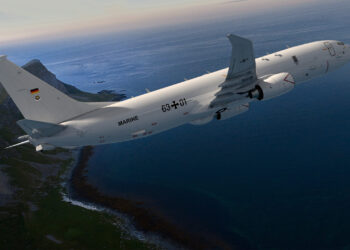US Navy,
NAPLES, Italy: Military Sealift Command (MSC) ships USNS 2nd Lt. John P. Bobo (T-AK 3008) and USNS LCPL Roy M. Wheat (T-AK 3016) arrived off the coast of Monrovia, Liberia, in the Gulf of Guinea, March 20. They will participate in a sea-basing and humanitarian aid distribution exercise in conjunction with U.S. Marines and Africa Partnership Station ships USS Fort McHenry (LSD 43) and HSV-2 Swift.
Bobo and Wheat are U.S. Navy cargo ships that are part of Maritime Prepositioning Ship Squadron (MPSRON) 1, one of three squadrons that preposition U.S. military equipment in strategic locations at-sea for rapid delivery ashore in response to military or humanitarian crises. These squadrons are commanded by a U.S. Navy captain with an embarked military staff, while the ships themselves are crewed by U.S. merchant mariners under contract to MSC. HSV-2 Swift, a high-speed vessel, is chartered by MSC, and is operated and crewed by U.S. Navy Sailors.
Africa Partnership Station (APS) is a U.S. Naval Forces Europe initiative that provides maritime training to partner nations in West and Central Africa aboard Navy ships operating in the region.
During the late March exercise, Bobo, Wheat, Swift and Fort McHenry will congregate off the coast of Monrovia. Sailors embarked aboard Bobo and Wheat will assemble the MPSRON's Improved Navy Lighterage System (INLS) which is a roll-on/roll-off discharge platform comprised of barges and ferries that allow ships to off-load cargo at sea and deliver it ashore when traditional harbor facilities are unavailable.
|
Click to Enlarge
The high-speed vessel (HSV 2) Swift is moored pier-side at Naval Amphibious Base Little Creek before departing for the western coast of Africa.
More Military Pictures
|
Once the INLS is assembled, cargo from Bobo, Wheat and Fort McHenry, including trucks, equipment and humanitarian aid supplies, will be transferred at sea from Bobo to Swift while the high speed vessel is docked on the discharge platform. Swift will then ferry these supplies to Monrovia where they will be delivered to a number of schools and medical clinics in Liberia.
“We are excited to be able to participate in APS,” said Capt. Clay Saunders, MPSRON 1's commander. “The opportunity to validate our seabase concept and exercise our ship-to-shore capabilities while supporting a non-exercise humanitarian aid operation really demonstrates the broad capabilities of our prepositioned force.”
The exercise, which will showcase the real world application of the Navy's seabasing concept, also gives the ships, Sailors and Marines involved, the opportunity to train alongside Liberian military personnel who will be participating in the operation.










